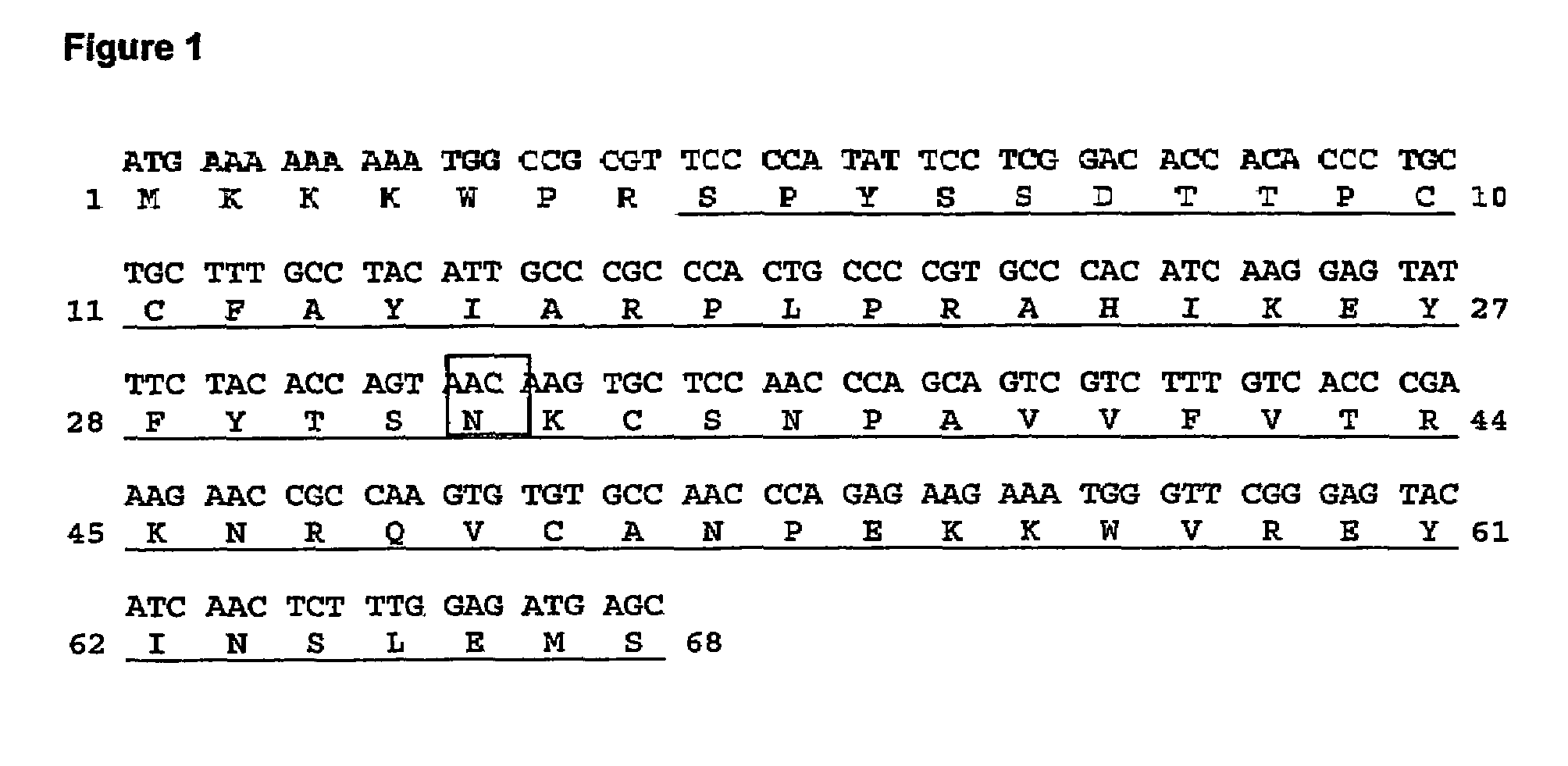Chemokine mutants acting as chemokine antagonists
a technology of ccchemokine and mutants, applied in the field of ccchemokine mutants acting as ccchemokine antagonists, can solve the problem that none of these approaches have exhaustively studied the properties of all mutants deriving from the non-conservativ
- Summary
- Abstract
- Description
- Claims
- Application Information
AI Technical Summary
Benefits of technology
Problems solved by technology
Method used
Image
Examples
example 1
Construction and Expression of RANTES Mutants in Position 32
[0086]Human RANTES was expressed in E. coli in four mutated forms in position 32, which either Gly or Ser in a subset of CC-chemokines which have either Ser or Thr in the two immediately preceding positions (compare FIGS. 1 and 10).
[0087]The RANTES mutants were expressed as mature RANTES variants containing a heterologous Met-starting, leader sequence (MKKKWPR), which is later eliminated from this precursor (secRANTES G32N protein; SEQ ID NO: 9; FIG. 1) using a proteolytic enzyme to obtain the mature protein (RANTES G32N; SEQ ID NO: 1). The mutated position is indicated as 32 since it refers to the mature protein.
[0088]The DNA encoding for the mutant (secRANTES G32N DNA; SEQ ID NO: 8; FIG. 1) was generated by PCR mutagenesis of human RANTES by performing a two-step PCR-based mutagenesis, using two oligonucleotides pairs hybridizing a human RANTES sequence fused to the same leader sequence and cloned in the expression vector...
example 2
Equilibrium Competition Receptor Binding Assays
[0096]The assays were carried out on membranes from CHO transfectants expressing CCR1 and CCR5 using a Scintillation Proximity assay (SPA) using [125I]-MIP-1α as tracer. Competitors were prepared by serial dilutions of the unlabelled chemokines in binding buffer to cover the range 10−6-10−12 M. The binding buffer used was 50 mM HEPES, pH 7.2 containing 1 mM CaCl2, 5 mM MgCl2, 0.15 M NaCl and 0.5% Bovine Serum Albumin. Wheat germ SPA beads (Amersham) were solubilised in PBS to 50 mg / ml, and diluted in the binding buffer to a 10 mg / ml, and the final concentration in the assay was 0.25 mg / well. Membranes expressing CCR1 or CCR5 were stored at −80° C. and diluted in the binding buffer to a concentration of 80 μg / ml. Equal volumes of membrane and bead stocks were mixed before performing the assay to reduce background. The final membrane concentration was 2 μg / ml and that of [125I]-MIP-1α was 0.1 nM. The plates were incubated at room temperat...
example 3
[0098]Monocytes were purified from buffy coats using the following isolation procedure. A buffy coat solution (100 ml) was diluted with 100 ml PBS, layered on Ficoll and centrifuged at 600×g for 20 min at room temperature. The cells forming the interface were collected and washed twice with PBS. The monocytes were enriched by negative selection by depletion of T cells, NK cells, B cells, dendritic cells and basophils using the MACS cell isolation kit (Miltenyi Biotech).
[0099]The monocytes were resuspended at 1.5×106 / ml in RPMI 1640 medium, without Phenol red. The purity was measured by forward and side scatter by FACS analysis. Chemokine dilutions (30 μl), covering the range of 10−6-10−12 M in RPMI medium (without Phenol red), was placed in the lower wells of a 96-well chemotaxis chamber (Neuroprobe). The filter unit (3 μm pore size) was placed over the lower wells ensuring that there are no air bubbles. The cell suspension (20 μl at 1.5×106 cells / ml in RPMI mediu...
PUM
| Property | Measurement | Unit |
|---|---|---|
| pH | aaaaa | aaaaa |
| pH | aaaaa | aaaaa |
| mass | aaaaa | aaaaa |
Abstract
Description
Claims
Application Information
 Login to View More
Login to View More - R&D
- Intellectual Property
- Life Sciences
- Materials
- Tech Scout
- Unparalleled Data Quality
- Higher Quality Content
- 60% Fewer Hallucinations
Browse by: Latest US Patents, China's latest patents, Technical Efficacy Thesaurus, Application Domain, Technology Topic, Popular Technical Reports.
© 2025 PatSnap. All rights reserved.Legal|Privacy policy|Modern Slavery Act Transparency Statement|Sitemap|About US| Contact US: help@patsnap.com



